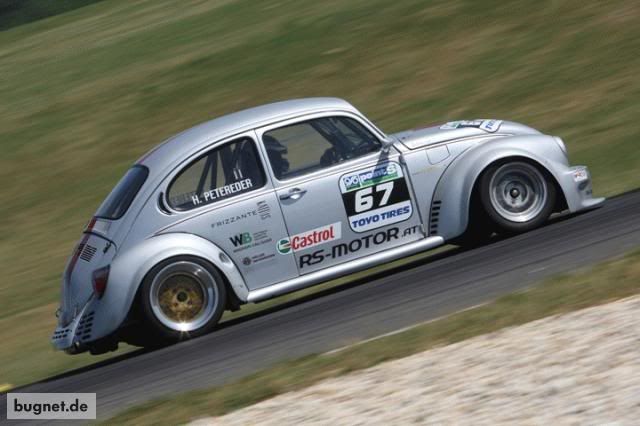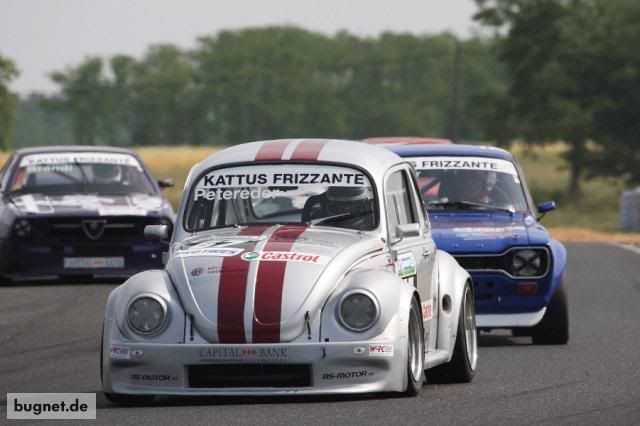
 |
|
#106
|
||||
|
||||
|
Nice touch with exhaust exit.

|
|
#107
|
||||
|
||||
|
An little bit bigger than mine one.
 The "foots" for the wing will be machined new, also the sideplates. WIebrand
__________________
B-Extreme B-Tuning..... Racebug is comming to get ya!!! |
|
#108
|
||||
|
||||
|
In Perú we use for 110 Mph this 2
bumper and in front the windshield (trasnparent) http://groups.msn.com/vwclubdelperu/starosamayo2005.msnw?action=ShowPhoto&PhotoID=4517 http://groups.msn.com/vwclubdelperu/starosamayo2005.msnw?action=ShowPhoto&PhotoID=4521 http://groups.msn.com/vwclubdelperu/starosamayo2005.msnw?action=ShowPhoto&PhotoID=4522 http://groups.msn.com/vwclubdelperu/starosamayo2005.msnw?action=ShowPhoto&PhotoID=4525 http://groups.msn.com/vwclubdelperu/starosamayo2005.msnw?action=ShowPhoto&PhotoID=4531 CARLOS PALOMINO |
|
#109
|
|||
|
|||
|
This thread has been dead for a while, but I thought I'd post this picture of airflow over a bug that I found.
|
|
#110
|
||||
|
||||
|
Find one of those for a Ghia and we're talkin!

|
|
#111
|
||||
|
||||
|
Wanted to raise this one from the dead:
Here's my thoughts on aero on a bug: Green: downforce Red: lift/resistance Yellow lift/resistance zones  Thinking about slotting out this area of my fender:  How well do either of these work?:   Jason
__________________
If I could just get paid for my sleepless nights.... 1960 VW Bug UBRDUB Walkaround 1st Drag Run Dyno Run Oval Ragster-'57 Rag/'04 Boxster S |
|
#112
|
||||
|
||||
|
The fender slotting is generally a good idea I think.
The Remmele bug also has extensive holes in the rear apron and rear fenders for letting out hot exhaust radiant heat as well as decreasing rear lift imo. I suppose any rear roof device works, if only to distort the laminar flow there so lift is reduced. Look at these race bugs for reference of things you can do. Racing brings out the best developments in people don't you agree?   
|
|
#113
|
||||
|
||||
|
Generally the reason you put vents in the fenders is to let the high pressure air out of the wheel well. Bug and non-bug alike all have this problem where high pressure high builds in the fender wells (because of the wheel openings, tire/air interaction, brake/radiator ducting) causing drag. Louvers on top for the fenders or holes in the back relieve the air pressure and if done right can even add down force or reduce drag.
I'm going to make similar cuts in the backs of my front fenders though possibly higher up. On the rears I haven't decided if or where I'll cut but I've considered hacking 4" off the bottom of the rear fenders so they didn't catch air. One of my sources of inspiration is the 997 turbo, with the larger rear fender vents and I thought about something like that as well I've been looking for one of those lip spoilers for the top of my car but I'm not sure who has them in stock. I'd like to put one one the race bug and decrease the angle of attack on the wing. |
|
#114
|
||||
|
||||
|
Carbon Joe said he could make a roof lip for me in a little while, should I double the order?
Jason
__________________
If I could just get paid for my sleepless nights.... 1960 VW Bug UBRDUB Walkaround 1st Drag Run Dyno Run Oval Ragster-'57 Rag/'04 Boxster S |
|
#115
|
||||
|
||||
|
Has anybody tried this program? I can't remember where I found it, came across it again while sorting through my favourites...
http://www.equationsinmotion.org/equationsinmotion
__________________
http://www.ricola.co.uk |
|
#116
|
||||
|
||||
|
Quote:
I think you will find that the area at the base of the screen will be a high pressure area (that is where most manufacturers put the cabin air intake) and there will be a high pressure area at the very front of the car with a low pressure area immediately behind it that usually equates to the front quarter of the nose. As regards the flow over the rear window, I did see some years ago a flow path photo that implied that the air hugged the body shape pretty closely. If so, that would not create a low pressure area as you suggest it would be closer to neutral although I am inclined to believe that this is actually a mildly high pressure zone given the shape of the venting immediately under the rear window. This area is where VW expect the engine to take its cooling air from and supply cool air to the carb. If it were low pressure then the fan and the carb would be fighting for breath. This logic is further enhanced by the use of engine cover wings and the siting of intercoolers. The roof lip spoilers are there under normal circumstances to create a break in the laminar flow to induce a negative (i.e. below atmospheric) pressure bubble at the rear that in a beetle ought to cause lift and poor cooling unless say, air was ducted from below the floor pan to vent into the engine compartment and then into the low pressure air zone. Whilst I have not seen many aerodynamic assessments/records for the bug I have for the 911 particularly the racing 935s etc, which in many respects is a squashed bug (  forgive the pun) and much of what I have said holds very true. there was some interesting work done on the 911 with regards to the effect of the wings that were hugely extended beyond the main body that was not too dissimilar to the beetle. The aerodynamic findings was that drag was significantly reduced if the tops of the wings were extended rearwards as much as possible - connecting the front and rear wings showed the least drag. The wheel arch areas were indeed high pressure and rear venting was benefcial not least in brake cooling. forgive the pun) and much of what I have said holds very true. there was some interesting work done on the 911 with regards to the effect of the wings that were hugely extended beyond the main body that was not too dissimilar to the beetle. The aerodynamic findings was that drag was significantly reduced if the tops of the wings were extended rearwards as much as possible - connecting the front and rear wings showed the least drag. The wheel arch areas were indeed high pressure and rear venting was benefcial not least in brake cooling.Clive |
|
#117
|
||||
|
||||
|
Jason, if you order one, double it for sure and I'll grab it off you. Thanks!
|
|
#118
|
|||
|
|||
|
Love to see this topic raised from the dead
 I would like to correct/ increase definition on some things said before. *First take a look at the link Rich gave us which is very helpful. *Consider looking at the right side of a car (ie right is front, left is back) and for the ease of explanation consider the car as 2d (the overall profile on the centreline) *Stagnation point is a theoretical point ahead of smthng that moves through and the air starts to split at this point in order for the part to move through the air. WE, OUR CARS move THROUGH the air, not the other way... 1. As we move toward left the car starts to show its profile. our bumper being the foremost point, it has a stagnation point just ahead of it. Since the bumper isn't solid as it moves through air, the air suddenly gets sucked by the rear of the bumper, creating a vacuum effect and spiraling vertices. 2. next is the handle on the front hood. lets say it just splits the air left to right, so it is negligible at this moment(we could use it if talking 3d) 3. next is the profile of the front hood. specifically on the 1303 and less on the older bugs it has a hump facing forward. this has another stagnation point that the spirals from the bumper interfere with. THERE is the first actual problem area due to the LOW PRESSURE POINT BEHIND the bumper and the HIGH PRESSURE POINT IN FRONT of the hood. IN GENERAL every clean profile that the air gets to "see" first is a HIGH PRESSURE AREA, analyzed in HIGH PRESSURE POINTS and the opposite is for the LOW PRESSURE/VACUUM AREA/POINTS Evil, the reason the auto makers put the air intake between the windshield and the hood is that the create a strong vacuum zone by raising the rear lip of the hood (to further promote the effect) so air can be SUCKED in. Also the fan at the back actually works, because it lays in a low pressure area (engine compartment) that is connected to the "laminar" air flow at the rear with the grills below the rear window. Don't confuse ram air that can work with carbs, efi with the actual fan that is if we could put a big hose supplying air directly into the fan the fan would spin, but there would be no air flow. same applies to turboprop engines in aircraft where u have a turbine spinning and a gearbox actually a huge reduction box that the prop is connected on to. if the ratio of turbine/prop was 1:1 the prop would go supersonic and the effect will be the same as spinning the same prop in space at zero pressure this a real example from the cessna super cargomaster caravan aircraft where the turbine runs at 33000rpm @ 75% thrust and the prop at a mere 1750rpm.this is why u cannot go supersonic with a prop and only with a jet sorry for the non germanlook example, it was the most recent i had from a personal experience Chris
__________________
Aircooled 4ever 1973 1303 going towards GL |
|
#119
|
||||
|
||||
|
So, from all this knowledge/experience above, what would you suggest to be the first/best action to do on our little bugs Chris?
|
|
#120
|
|||
|
|||
|
I will reply as soon as i get home.iphone isnt very easy on writting emails.what im going to do is get a rake on my 1303, get some kind of spoiler @ front to reduce the air gioing under and try to evac as much air as possible from wings.
Chris
__________________
Aircooled 4ever 1973 1303 going towards GL |
 |
| Currently Active Users Viewing This Thread: 1 (0 members and 1 guests) | |
|
|